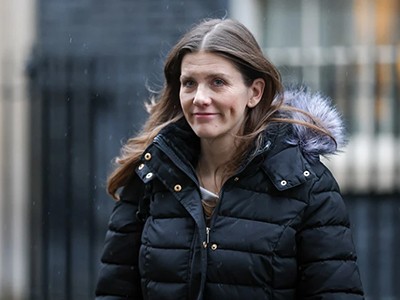
Riski Sunak’s government has brought a seriousness to UK relations with the EU.Credit: Jack Hill/AFP/Getty
“We are more than ready to go it alone.” One of the first public statements made by Michelle Donelan, the United Kingdom’s new secretary of state for science, was to declare that the country’s scientific community can live without European Union funding schemes. That might be true in the literal sense. But her sentiment, contained in an article for The Sunday Telegraph newspaper on 12 February, was not the headline message that researchers were hoping for from their new, cabinet-level, minister. It was also not the message of a government that is serious about its aspirations to make the United Kingdom a ‘science superpower’, as ministers have frequently claimed.
Science leaders had broadly welcomed Donelan’s appointment, and the elevation of science to a cabinet-level department. But there has been dismay at the ‘go-it-alone’ rhetoric.
UK science ministers often attend the top table of decision-making, but the science ministerial position is not usually a cabinet-level one. The new Department for Science, Innovation and Technology now brings together research funding, research strategy and digital technologies, which were previously in three separate departments. Crucially, Donelan reports to Prime Minister Rishi Sunak, and will focus on harnessing science and innovation for economic growth, in which the United Kingdom lags behind most of its peer-group countries.
UK government announces new science department and minister
But building research for any purpose (whether for discovery science, the science needed in environmental protection, or science for industrial development) is not like heating an oven-ready microwave meal. Results are not a matter of plucking something off the shelf, pressing some buttons and getting an outcome in record time.
As Robin Grimes, former chief science adviser to the UK defence ministry, told members of the UK Parliament last year, the collaborative relationships that are leading to advances in research have, in some cases, been decades in the making. If these are severed, new ones can’t be formed instantly.
Research in the United Kingdom is already suffering from the loss of European relationships. Formerly UK-based holders of prestigious European Research Council grants have had to relocate to an EU country to keep these grants. And, in future, there are likely to be fewer European researchers in the United Kingdom following a collapse in the number of EU students coming to the country to study. Many of these students would have stayed to pursue further studies and research, making the country their home in the process.
UK universities report sharp post-Brexit drop in EU students
A sensible science policy is impossible, therefore, unless the question of EU research collaboration and funding is addressed. And on that point the UK government seems to be giving out mixed messages.
At the heart of this dispute is UK membership of Horizon Europe, the EU’s flagship research and innovation programme for 2021–27, with a budget of €95.5 billion (US$102.4 billion). Before Brexit, UK-based scientists were automatically eligible to apply for EU funds — and had among the bloc’s highest success rates. Now the United Kingdom must apply for what is called associate membership, a category in which the country must pay separately to access the fund.
The EU says that the United Kingdom can participate in Horizon Europe, but it has imposed a political condition: participation will be allowed only once there is resolution in a dispute over trading arrangements between the United Kingdom and the EU on the UK border with Ireland — a problem that has been rumbling on since the United Kingdom formally left the bloc in January 2020.
Seriousness meets urgency
There is some rare good news here. Sunak’s government, in contrast to the administration of former prime minister Boris Johnson, has brought seriousness and urgency to these talks — so much so that there are reports of a (possibly) imminent deal. An agreement, whenever it happens, would be a substantial step towards UK and EU researchers being able to work together again as they did for nearly five decades.
In another rare move, politicians of the major UK political parties, along with experts and business leaders, met last week to discuss, among other things, how to move forwards constructively with EU partners in a post-Brexit world. This, too, is welcome, because it suggests that there’s a real desire for a national consensus on new beginnings with the EU.
This journal hopes that Donelan will adopt such a spirit when dealing with researchers and with the EU. The minister mentioned in her Sunday Telegraph article that the United Kingdom would establish its own replacement fund for collaborations with research-intensive non-EU nations, including Japan, Switzerland and the United States, if association to Horizon Europe did not materialize.
Any such collaborations are to be welcomed. But where’s the logic in comparing them to — or using them to downplay — the United Kingdom’s existing science relationships? If the country really aspires to harness science in the service of society and the economy, multiple collaborative projects, on many levels, will be required: within and between disciplines, globally and regionally, including with the United Kingdom’s nearest neighbours.

 UK government announces new science department and minister
UK government announces new science department and minister
 UK universities report sharp post-Brexit drop in EU students
UK universities report sharp post-Brexit drop in EU students
 A guide to Plan B: the UK’s vague strategy for post-Brexit science funding
A guide to Plan B: the UK’s vague strategy for post-Brexit science funding
 Keep science out of Europe’s post-Brexit arguments
Keep science out of Europe’s post-Brexit arguments
 UK and EU: Cherish what you have achieved and stay close
UK and EU: Cherish what you have achieved and stay close
 Horizon 2020 by the numbers: how €60 billion was divided up among Europe’s scientists
Horizon 2020 by the numbers: how €60 billion was divided up among Europe’s scientists





